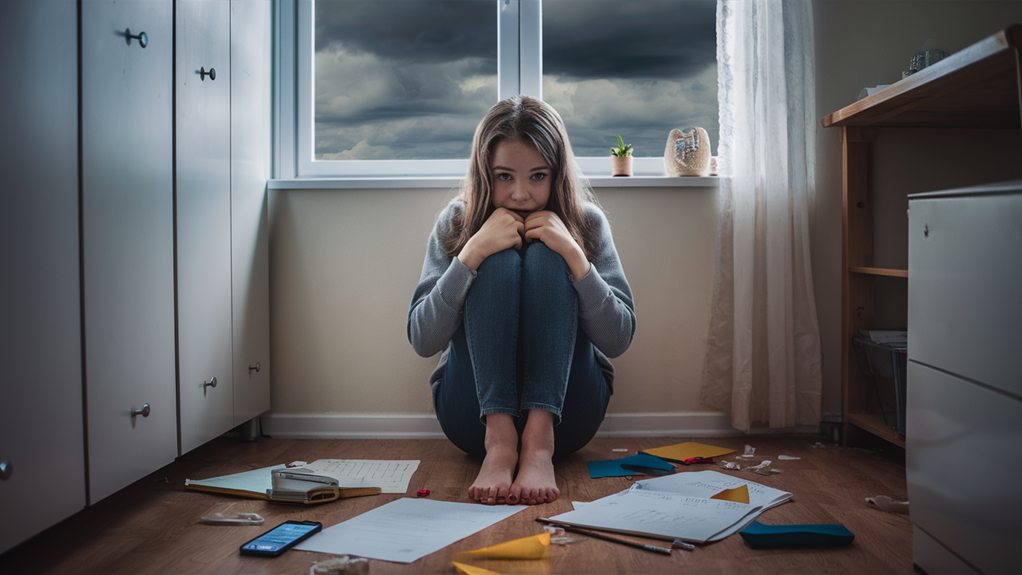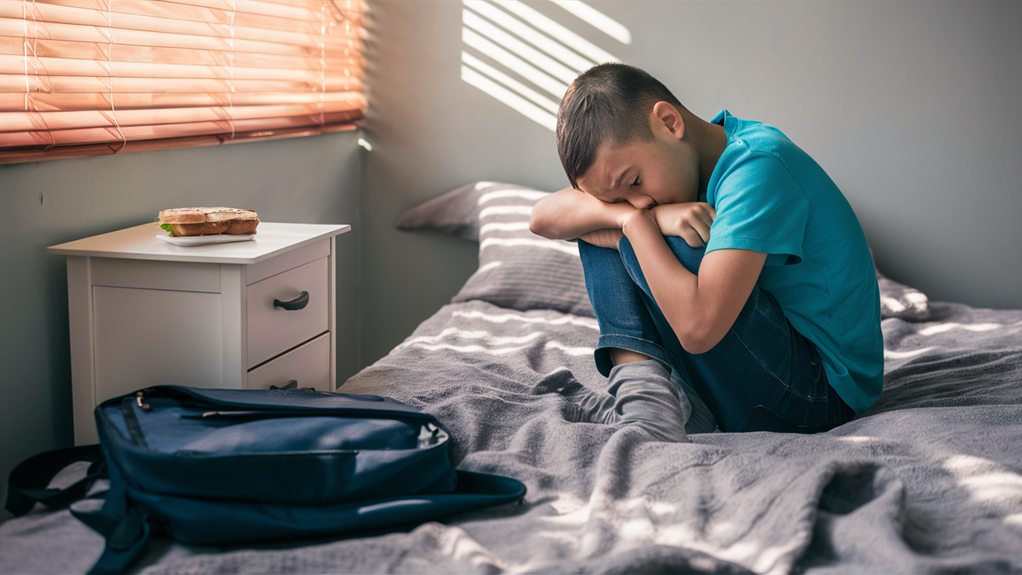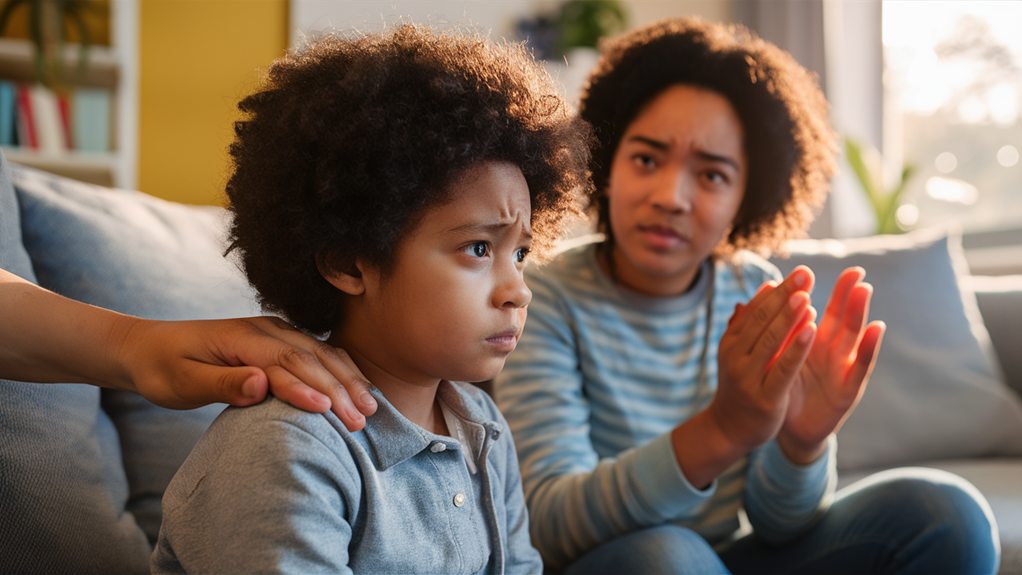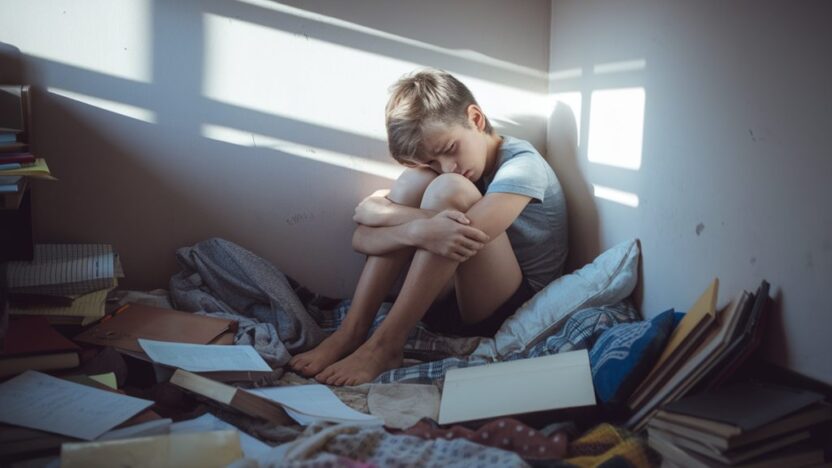If you're worried about anxiety in a young person, you'll want to watch for both physical and emotional signs. Common symptoms include headaches, stomach problems, trouble sleeping, and changes in behavior like avoiding friends or struggling to concentrate. These signs often appear during stressful situations like tests or social events, but they can also emerge without clear triggers. While anxiety can seriously impact daily life, affecting school performance and relationships, there's good news: effective treatments are available, from therapy to lifestyle changes. Understanding how anxiety works in young people is your first step toward finding the right support and solutions.
Signs and Warning Signals

Recognizing anxiety in young people isn't always straightforward, as children and teens often express their worries differently than adults. It's important to understand that anxiety can manifest in various forms, including different anxiety disorders, which may present unique symptoms and triggers.
You'll want to watch for physical signs, like frequent headaches, stomach problems, or changes in sleeping patterns, which can be clear indicators of underlying stress and worry.
When observing signs of anxiety in young people, you'll notice behavioral changes that might include avoiding social situations, struggling to concentrate in class, or becoming irritable more easily. Your child might start asking repetitive questions seeking reassurance, displaying excessive perfectionism, or having trouble completing everyday tasks due to overwhelming fears.
Physical manifestations can also include rapid breathing, sweating, trembling, or complaints about feeling dizzy or lightheaded.
You'll often see these symptoms emerge before specific events, like tests or social gatherings, but they can also appear without obvious triggers. If you're noticing that your child is frequently procrastinating, expressing excessive worry about the future, or experiencing panic-like symptoms, it's important to recognize these as potential signs of anxiety that deserve attention and support.
Common Triggers
Understanding the triggers that spark anxiety in children and teens is essential for effective intervention and support. When you're helping a young person with childhood anxiety, you'll need to recognize that seemingly ordinary situations can become significant stressors.
Academic pressures, such as tests, homework, and class presentations, often top the list of anxiety triggers for many students. Additionally, children may experience heightened anxiety when they struggle to manage these academic demands, which can lead to a cycle of stress and underperformance.
Anxiety symptoms can manifest in various ways, making it vital for caregivers to identify and address these challenges early on.
Social situations can be particularly challenging, including making new friends, maneuvering peer relationships, and participating in group activities. Family-related changes, like divorce, moving to a new home, or the arrival of a sibling, can also trigger anxiety symptoms.
You'll notice that perfectionism plays a major role, too, as many children feel overwhelming pressure to meet high expectations in various aspects of their lives.
Environmental factors, such as crowded spaces, loud noises, or unfamiliar surroundings, can trigger anxiety responses. World events and news coverage might also contribute to feelings of worry and fear, especially when children are exposed to troubling information through media or conversations.
Performance situations, like sports competitions, recitals, or public speaking, frequently trigger anxiety in young people.
Impact on Daily Life

Anxiety's grasp on young people can disrupt nearly every aspect of their daily routines. When you're supporting someone with anxiety in teens, you'll notice how it affects their performance at school, relationships with friends, and even basic activities like eating or sleeping. The impact can be far-reaching, making ordinary tasks feel overwhelming and exhausting.
Similar to depression in teens, anxiety can manifest in unique ways, and understanding these signs is vital for early intervention. For instance, academic struggles might include difficulty concentrating during tests or speaking up in class, which can mirror the cognitive challenges faced by teens experiencing unique symptoms of depression.
- Academic struggles, including difficulty concentrating during tests or speaking up in class
- Social challenges, such as avoiding group activities or struggling to maintain friendships
- Physical symptoms that interfere with daily activities, like headaches or stomach problems
- Sleep disturbances that affect energy levels and mood the next day
You'll find that anxiety doesn't just affect one area of life – it creates a ripple effect that touches everything. When a teen is dealing with anxiety, simple tasks like getting ready for school or joining friends for lunch can become major hurdles.
Their participation in sports, clubs, or family activities might decrease, and you'll notice changes in their usual behavior patterns. Understanding these impacts helps you better support them through their challenges and recognize when they might need additional help.
Treatment Options
Three main paths exist for treating anxiety in children and teens: therapy, medication, and lifestyle changes. Understanding the specific type of anxiety disorder your child may be facing—such as generalized anxiety disorder or social anxiety disorder—can guide treatment decisions and improve outcomes different types of anxiety disorders.
When treating anxiety in children, cognitive behavioral therapy (CBT) often serves as the first line of defense, helping young people identify anxious thoughts and develop coping strategies. Your child's therapist will work closely with them to create practical tools they can use in challenging situations.
For some children, medication prescribed by a qualified psychiatrist can help manage severe symptoms, especially when combined with therapy. You'll want to discuss potential side effects and benefits thoroughly with your healthcare provider before starting any medication plan.
Lifestyle modifications play an essential role, too. You can help your child establish regular sleep schedules, encourage physical activity, and practice relaxation techniques together. Teaching deep breathing exercises, mindfulness, and progressive muscle relaxation gives them practical tools they can use anywhere.
Additionally, maintaining a balanced diet, limiting caffeine intake, and creating predictable routines can greatly reduce anxiety symptoms. It's important to remember that treatment plans often work best when combining multiple approaches, tailored specifically to your child's needs and circumstances.
Supporting Your Child

Supporting Your Child
Parents can take four key steps to support a child dealing with anxiety. When you're helping with anxiety management for children, it's important to create a supportive environment where your child feels safe discussing their worries.
You'll want to validate their feelings while gently encouraging them to face their fears in manageable steps. A strong support network, including family and friends, can enhance their coping strategies and provide reassurance during tough times, as the power of support networks is crucial in managing anxiety.
- Listen without judgment, and avoid dismissing their concerns with phrases like "don't worry" or "it's no big deal"
- Create consistent routines and schedules, which help children feel more secure and in control
- Model healthy coping strategies, showing them how to handle stress and anxiety in positive ways
- Praise their efforts to manage anxiety, not just the outcome, to build their confidence



